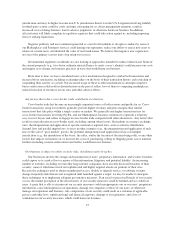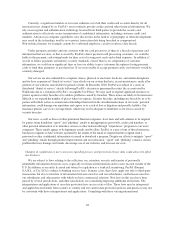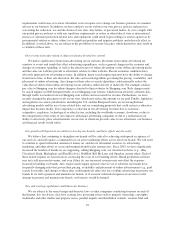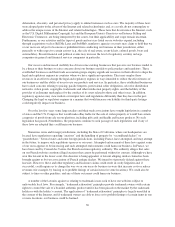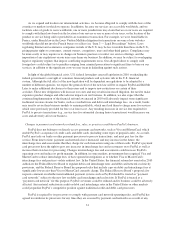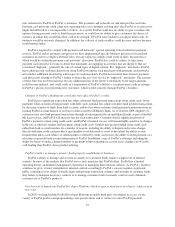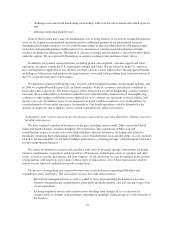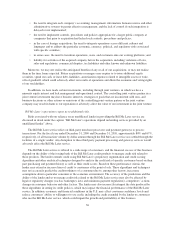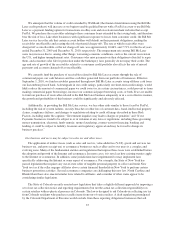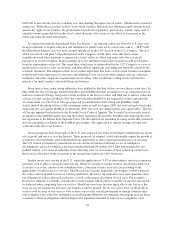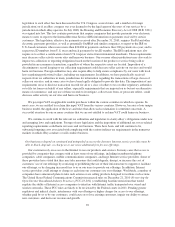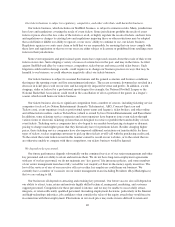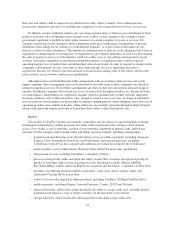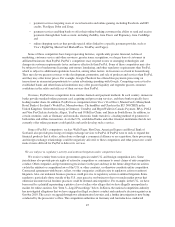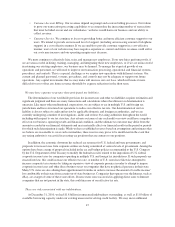eBay 2010 Annual Report Download - page 42
Download and view the complete annual report
Please find page 42 of the 2010 eBay annual report below. You can navigate through the pages in the report by either clicking on the pages listed below, or by using the keyword search tool below to find specific information within the annual report.We anticipate that the volume of credit extended by WebBank (the financial institution issuing the Bill Me
Later credit products) will increase as we begin to enable qualified buyers with a PayPal account to use Bill Me
Later as a payment funding option for transactions on eBay.com and on certain merchant websites that accept
PayPal. We purchase the receivables relating to these consumer loans extended by the issuing bank, and therefore
bear the risk of loss. Like other businesses with significant exposure to losses from consumer credit, the Bill Me
Later service faces the risk that certain account holders will default on their payment obligations, making the
receivables uncollectible and creating the risk of potential charge-offs. The rate at which receivables were
charged off as uncollectible, or the net charge-off rate, was approximately 10.66% and 7.71% for the fiscal years
ended December 31, 2009 and December 31, 2010, respectively. The nonpayment rate among Bill Me Later
users may increase due to, among other things, worsening economic conditions, such as the current recession in
the U.S., and higher unemployment rates. Consumers who miss payments on their obligations often fail to repay
them, and consumers who file for protection under the bankruptcy laws generally do not repay their credit. The
age and rate of growth of the receivables related to a consumer credit portfolio also affects the rate of missed
payments and accounts charged off as uncollectible.
We currently fund the purchase of receivables related to Bill Me Later accounts through the sale of
commercial paper, our cash balances and free cash flow generated from our portfolio of businesses. Effective
September 1, 2010, we fund receivables generated through new Bill Me Later accounts using offshore cash from
our Luxembourg-based bank. A downgrade in our credit ratings, particularly our short-term credit ratings, would
likely reduce the amount of commercial paper we could issue (or, in certain circumstances, could prevent us from
making commercial paper borrowings), increase our commercial paper borrowing costs, or both. If we are unable
to fund our purchase of receivables related to the Bill Me Later business adequately or in a cost-effective manner,
the growth and profitability of this business could be significantly and adversely affected.
Additionally, in providing the Bill Me Later service, we face other risks similar to those faced by PayPal,
including the risk of system failures, security breaches or other loss of customer data, fraud, intellectual property
claims, compliance failures, and changes to regulations relating to credit offerings described in these Risk
Factors, including under the captions “Government inquiries may lead to charges or penalties” and “If our
Payments business is found to be subject to or in violation of any laws or regulations, including those governing
money transmission, electronic funds transfer, money laundering, counter-terrorist financing, banking and
lending, it could be subject to liability, licensure and regulatory approval and may be forced to change its
business practices.”
Our business and users may be subject to sales tax and other taxes.
The application of indirect taxes (such as sales and use tax, value-added tax (VAT), goods and services tax,
business tax, and gross receipt tax) to ecommerce businesses such as eBay and to our users is a complex and
evolving issue. Many of the fundamental statutes and regulations that impose these taxes were established before
the adoption and growth of the Internet and ecommerce. In many cases, it is not clear how existing statutes apply
to the Internet or ecommerce. In addition, some jurisdictions have implemented or may implement laws
specifically addressing the Internet or some aspect of ecommerce. For example, the State of New York has
passed legislation that requires any out-of-state seller of tangible personal property to collect and remit New
York use tax if the seller engages affiliates above certain financial thresholds in New York to perform certain
business promotion activities. Several ecommerce companies are challenging this new law. North Carolina and
Rhode Island have also enacted similar laws related to affiliates, and a number of other states appear to be
considering similar legislation.
The State of Colorado recently enacted new legislation that takes a slightly different approach by imposing a
set of use tax collection notice and reporting requirements (but not the actual tax collection responsibility) on
certain retailers with no physical presence in Colorado. The law is designed to aid Colorado in collecting use tax
from Colorado residents who purchase taxable items from out-of-state retailers. A draft regulation promulgated
by the Colorado Department of Revenue would exclude from these reporting obligations businesses that sell
37


